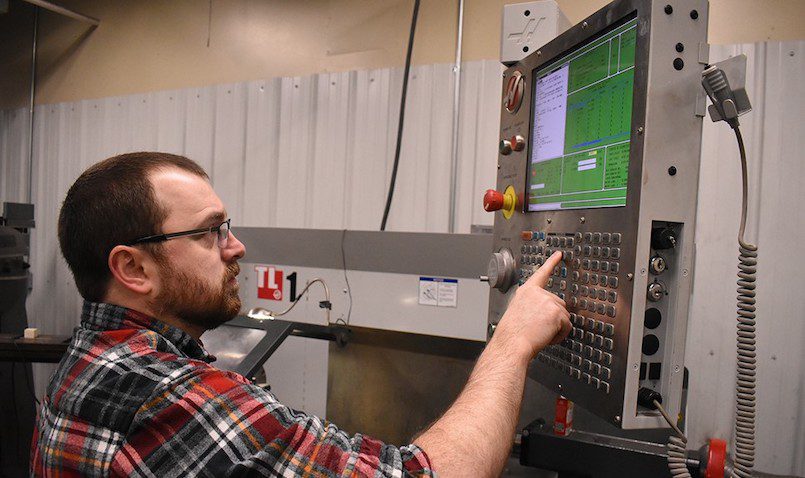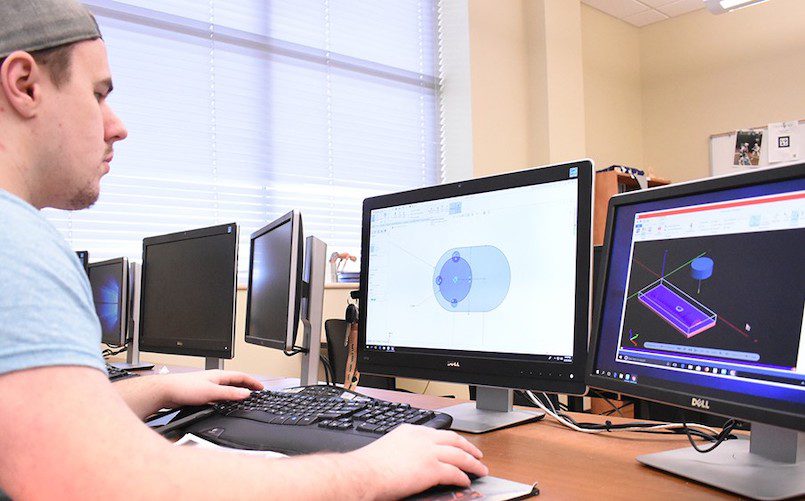29 Aug 2022 ASU-Beebe awarded over $1 Million in workforce grants
BEEBE —Arkansas State University-Beebe was recently awarded $1,080,000 in Regional Workforce Grant Awards from the Arkansas Division of Higher Education.
The Computerized Machining and Industrial Technology programs on the Searcy campus will receive $1 million, and the Computer Aided Drafting and Design program on the Beebe campus will receive $80,000 toward the development of automation and robotics curriculum within the program.
ASU-Beebe Chancellor, Dr. Jennifer Methvin made the announcement during a college forum. “We are grateful to the State of Arkansas for this funding to enable our instructors to provide the level of education and skills needed.” Dr. Jason Goodner, Vice Chancellor for Academics, added, “The grants awarded will focus on providing workforce training to meet the needs of industry and companies in these high-tech fields.”

Derrick Holobaugh, Advanced Instructor for Computerized Machining Technology and Program Coordinator for the Career Education Division, said the grant will be used to purchase 15-20 new pieces of equipment to both the Computerized Machining and the Industrial Technology programs. Several CNC machines, such as a 5-axis machine and a lathe for live tooling, will be purchased for the machining program. The Industrial Technology program will be adding mechatronic lines, mechanical drive trainers, and conveyor systems.
“The addition of these machines and equipment will allow the programs to teach students on the latest technology for careers in these high demand fields,” Holobaugh said. “We can teach the students skills we have never been able to teach before. This technology will better simulate the current manufacturing environment in the state.”
Kendall Casey, Director of Career Education, said the $80,000 grant awarded to the Computer-Aided Drafting and Design program will be used to upgrade equipment in both CADD laboratories located in the Advanced Technology and Allied Health Building.
Casey said Fused Deposition Modeling (FDM) 3D printers have been around for many years. “We were fortunate enough to acquire an industrial-grade FDM 3D printer in 2004. This machine has served us well over the years but has recently given out.” He said the award will be used to purchase two new industrial FDM 3D printers, one for each of the laboratories.
Casey added that industrial-grade 3D printers are also capable of more advanced part designs as a result of newer technology known as generative design, which uses artificial intelligence to develop the necessary geometry based on design criterion. “Having industrial 3D printers gives our students the ability to see, feel, and better understand their custom designs. Making parts also gives our students firsthand knowledge regarding dimension precision, assembly tolerances, and fits.”

The grant will also be used to purchase two new large format plotter/copier/scanner machines. “Plotting large sets of drawing sheets is also a common task for entry-level CADD technicians and will allow our graduates to have hands-on experience with the type of equipment they are likely to work with in the field,” Casey said. He added that each plotter/copier/scanner will have dual size rolls of paper giving students the ability to quickly plot C, D, or even E size drawings in both laboratories.
“The manufacturing industry in Arkansas has really been growing over the past few years,” Holobaugh said. “I get calls all the time from business and industry looking for students to come to work. I have placed many students in jobs before they have even finished the program.” Casey echoed that, saying, “The demand for CADD technicians in this region has been phenomenal over the last few years. We frequently receive calls from employers seeking our graduates or in many cases our experienced students nearing graduation.” Casey said the Associate of Applied Science in CADD degree prepares students as entry-level technicians for the mechanical, civil, structural, and architectural fields.
Holobaugh said after completing the Computerized Machining and Industrial Technology programs, students will be able to work in careers, such as CNC Machinist, Manufacturing Technician, or Industrial Maintenance Technician with an average salary in Arkansas between $17 to $24 an hour. Casey said according to the U.S. Bureau of Labor Statistics’ May 2021 Wage Estimates for Arkansas, the 50% median wage for mechanical drafters is $28.94 per hour or $60,200 per year. “The knowledge and hands-on skills obtained through these technical programs can lead to very rewarding career opportunities,” Casey said.










